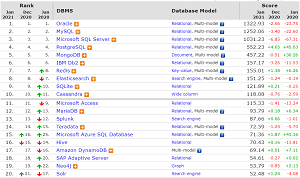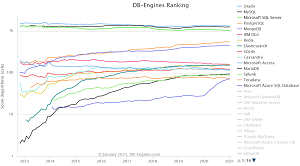News
Azure SQL Database Ranked Among Top 3 Databases of 2020
Microsoft touted the inclusion of Azure SQL Database among the top three databases of 2020 in a popularity ranking by DB-Engines, which collects and manages information about database management systems, updating its lists monthly.
The site also compiled stats for the full year of 2020, awarding second place to Microsoft's flagship cloud DBMS offering. Taking first place, and thus being named "DBMS of the Year 2020," is PostgreSQL, a repeat winner.
Microsoft took to the blogosphere to publicize its ranking, which set a record of its own, according to DB-Engines. "In the 9 years of DB-Engines, it is the first time that a cloud database service comes in within the top three of the Database of the Year award," the organization said in a Jan. 4 post.
About a week later, Microsoft penned its own post about the award, stating: "DB-Engines collects information on database management systems and it provides a widely accepted popularity ranking of database management systems. Azure SQL Database's popularity score increased 253 percent through 2020."
 [Click on image for larger view.] Latest DB-Engines Rankings, Top 20 (source: DB-Engines).
[Click on image for larger view.] Latest DB-Engines Rankings, Top 20 (source: DB-Engines).
DB-Engines said that 253 percent improvement in the Azure SQL Database popularity score -- from 28.2 points to 71.4 points -- boosted the cloud database service from 25th place to 15th in the overall ranking (which doesn't strictly correspond the database of the year awards, which are based on the percentage increase in popularity year over year).
As the graphic below shows, the popularity of Azure SQL Database has skyrocketed over the past year, while plain old Microsoft SQL Server has stayed relatively flat over the years while decreasing slightly, especially over the past couple years.
 [Click on image for larger view.] DB-Engines Rankings Trend Chart (source: DB-Engines).
[Click on image for larger view.] DB-Engines Rankings Trend Chart (source: DB-Engines).
"Microsoft Azure SQL Database is a fully managed database as a service," DB-Engines said in announcing the second-place ranking. "It is built on the latest stable version of the Microsoft SQL Server product and optimized with features for running in the cloud (auto-scale, geo-replication, automatic tuning, ...). Consequently, features like manual backup/restore, management of server configuration parameters are not supported."
Azure SQL Database fared better in a ranking of "Best cloud databases of 2021" by TechRadar, published in November 2020, where it's No. 1.
DB-Engines uses a variety of means for its ranking, including the number of mentions on web sites, Google Trends, job offers and more, with the full methodology explained here.
About the Author
David Ramel is an editor and writer at Converge 360.